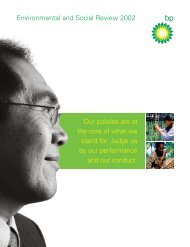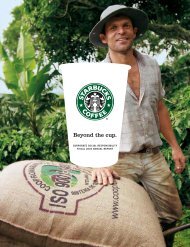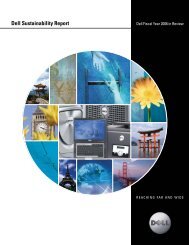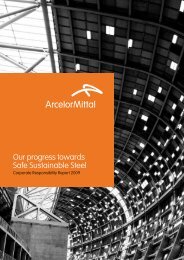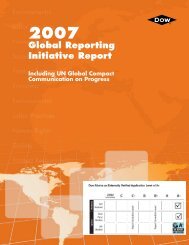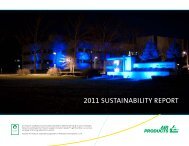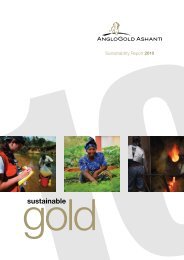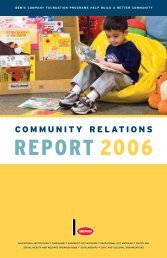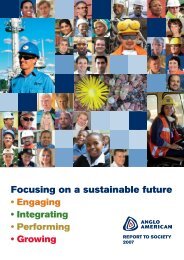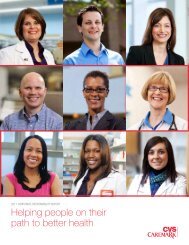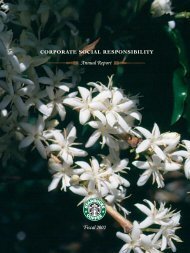Our Journey Continues - Dean Foods
Our Journey Continues - Dean Foods
Our Journey Continues - Dean Foods
Create successful ePaper yourself
Turn your PDF publications into a flip-book with our unique Google optimized e-Paper software.
®<br />
®
From<br />
Chairman<br />
Chief Executive Officer<br />
<strong>Our</strong> <strong>Journey</strong> <strong>Continues</strong><br />
In early 2008, I introduced our first Corporate Responsibility<br />
Update with a statement that is still true today: Finding<br />
ways to become more sustainable is a critical business<br />
priority. It is more than just the right thing to do, it is a<br />
requirement to succeed and stay competitive.<br />
In the two years since our first report, the world has changed<br />
dramatically. <strong>Our</strong> company, like so many others, continues<br />
to feel the effects of a global recession that fundamentally<br />
shifted consumer buying habits and changed the food<br />
industry. Despite these challenges, we continue to improve<br />
our business practices and remain focused on becoming a<br />
best-in-class food and beverage company. With every step<br />
in our journey, a strong sense of corporate responsibility<br />
remains an integral part of our efforts.<br />
As a first step, we align our corporate responsibility<br />
initiatives with our business objectives. As we work to<br />
transform our business, we are committed to doing it in a<br />
way that is right for us, right for consumers, right for our<br />
retail customers and right for the environment.<br />
<strong>Our</strong> and<br />
This means becoming more efficient in the way we operate<br />
and continuing to identify opportunities for improvement.<br />
The bulk of our sustainability programs focus on our<br />
manufacturing and distribution networks, where we<br />
can have the greatest impact. So far, we have realized<br />
millions of dollars in savings largely by reducing waste<br />
and duplication. As we begin to apply this same focus<br />
to our entire supply chain, we expect the result to be a<br />
business that is not only leaner, but also greener.<br />
We also continue to support programs that improve our<br />
local communities. Through the <strong>Dean</strong> <strong>Foods</strong> Foundation,<br />
we focus our giving on three key areas where we can<br />
have the greatest impact, and which align with our<br />
identity as a producer of healthy foods and beverages:<br />
ending childhood hunger, promoting nutrition education,<br />
and supporting a strong and sustainable<br />
agricultural community. In addition, our employees<br />
volunteer thousands of hours to charitable causes<br />
nationwide. <strong>Our</strong> management team works closely<br />
C O R P O R A T E R E S P O N S I B I L I T Y R E P O R T 2 0 1 0 ®<br />
with civic and business leaders to advance policy<br />
and other initiatives that help local economies thrive<br />
and prosper.<br />
Today, <strong>Dean</strong> <strong>Foods</strong> is one of the leading food and<br />
beverage companies in the U.S. and a European leader<br />
in soy foods and beverages. Continuing our success<br />
means making the right long-term choices for all of our<br />
stakeholders. This year’s report is about our progress<br />
and our plans to improve the impact we have on the food<br />
industry, on our communities and on our environment.<br />
We have made good progress and are proud of our<br />
accomplishments, but we know we have more to do.<br />
With every step forward we strive for a better,<br />
brighter future.<br />
Gregg L. Engles<br />
Chairman of the Board and Chief Executive Officer<br />
®
tableof<br />
contents<br />
The <strong>Dean</strong> <strong>Foods</strong> <strong>Journey</strong> P A G E 3<br />
Who We Are<br />
What We Do<br />
How We Do It<br />
Mapping <strong>Our</strong> Way P A G E 4<br />
From the Farm P A G E 5<br />
Sourcing<br />
Conventional Raw Milk<br />
Organic Milk<br />
Soybeans<br />
Non-Dairy Purchases<br />
To <strong>Our</strong> Manufacturing Plants P A G E 9<br />
Continuous Improvement Focus<br />
The Opportunity Radar<br />
Key Performance Indicators<br />
Product Quality<br />
Employee Safety<br />
Environmental 2013 Roadmap<br />
To <strong>Our</strong> Customers and Consumers P A G E 1 5<br />
Nourishing <strong>Our</strong> Consumers<br />
Made by <strong>Our</strong> Employees P A G E 1 7<br />
Employee Engagement<br />
Performance Management<br />
Diversity<br />
<strong>Dean</strong> <strong>Foods</strong> Steps Up P A G E 1 8<br />
Community Giving<br />
Corporate Giving<br />
The Next Steps In <strong>Our</strong> <strong>Journey</strong><br />
C O R P O R A T E R E S P O N S I B I L I T Y R E P O R T 2 0 1 0 ®<br />
®
The <strong>Dean</strong> <strong>Foods</strong> <strong>Journey</strong><br />
W H O W E A R E<br />
Every journey begins with a single step. <strong>Our</strong> journey began when our founders combined a number of<br />
local dairies, along with leading national beverage brands, to create <strong>Dean</strong> <strong>Foods</strong>. Today, <strong>Dean</strong> <strong>Foods</strong> is the<br />
largest processor and distributor of milk, dairy, and soy products in the U.S. with an expanding European<br />
presence. <strong>Our</strong> fresh and nutritious foods and beverages are created with pride by more than<br />
27,000 people working in approximately 100 plants across the U.S. and Western Europe.<br />
Throughout our history, families have trusted <strong>Dean</strong> <strong>Foods</strong> to provide fresh, nutritious products and to<br />
support their communities and causes. We are committed to building on that legacy by improving our<br />
efficiencies, growing our capabilities and shrinking our environmental footprint. In this, our second<br />
Corporate Responsibility Report, we chart our progress on that journey. <strong>Our</strong> goal is to assure our consumers,<br />
employees and stakeholders that the <strong>Dean</strong> <strong>Foods</strong> commitment to sound and ethical business practices,<br />
environmental stewardship and social responsibility is behind every product we sell, every step of the way.<br />
W H A T W E D O<br />
From our Dallas headquarters, <strong>Dean</strong> <strong>Foods</strong> is organized into two business divisions. <strong>Our</strong> Fresh Dairy<br />
Direct-Morningstar segment is the largest U.S. processor and distributor of milk, creamer and cultured<br />
dairy products marketed under more than 50 local and regional dairy brands, as well as through private<br />
labels. The WhiteWave-Alpro segment produces and sells an array of branded dairy, soy and plant-based<br />
beverages and foods. <strong>Our</strong> WhiteWave brands are category leaders and consumer favorites, including<br />
Silk ® soy and almondmilk, Horizon Organic ® milk and dairy products, International Delight ® coffee<br />
creamers and LAND O LAKES ® creamers. Alpro is the pan-European leader in branded soy food products.<br />
H O W W E D O I T<br />
We purchase agricultural inputs, mostly conventional and organic raw milk, from more than 12,000 dairy farmers<br />
and 500 organic family farms across the U.S. We also buy conventional and organic soybeans and sugar,<br />
juice concentrates, flavorings, oils and resins (to make plastic bottles). On the Fresh Dairy Direct side, we<br />
then process these materials into consumer products and transport them in our fleet of refrigerated vehicles –<br />
one of the largest in the country – to more than 150,000 outlets, including grocery and mass merchandise<br />
retailers, hotels and restaurants, convenience stores, schools, hospitals and other institutions. <strong>Our</strong> WhiteWave<br />
division processes and distributes its products nationally through a warehouse delivery system.
Mapping <strong>Our</strong> Way<br />
O U R A P P R O A C H T O C O R P O R A T E R E S P O N S I B I L I T Y<br />
As the largest processor of milk and dairy products in the U.S. and a world leader in the soy food and beverage market, we<br />
are privileged to touch many lives. With privilege comes responsibility. While our corporate responsibility journey continues<br />
to highlight the material issues we described in our 2008 report, we have since sharpened our focus to ensure that our<br />
initiatives directly align with our enterprise and business unit strategies.<br />
Since our last report, we have tried to become more engaged with corporate responsibility issues that exist throughout our<br />
supply chain, from raw inputs to finished products. We have made significant progress in working with the dairy industry and<br />
developing internal expertise to support our efforts.<br />
Additionally, we are investing in learning more about the impacts of our business through life cycle assessments (LCAs) of our<br />
products and our industry. Gaining a holistic and precise understanding of where the most significant impacts occur across<br />
our supply chain enables us to focus resources where we can make the most difference.<br />
H O W W E M A N A G E O U R E F F O R T S<br />
<strong>Dean</strong> <strong>Foods</strong> corporate responsibility programs and policies are managed through an organizational structure designed to ensure<br />
accountability and elicit stakeholder input. The Audit Committee of the Board of Directors provides oversight of activities.<br />
<strong>Our</strong> cross-functional Issues Working Group, led by the Vice President of Corporate Communications, identifies, prioritizes and<br />
manages issues and trends related to our corporate reputation and the interests of our stakeholders. This group helps ensure<br />
that the viewpoints of various constituencies are appropriately considered, and that our corporate positions are communicated and<br />
applied consistently across the company.<br />
In addition, we have focused our Sustainability Working Group on ensuring the inclusion of sustainability metrics when<br />
appropriate. The best example is work to achieve the goals set forth in our Environmental 2013 Roadmap. We also continue<br />
to identify key performance indicators (KPIs) to diligently measure our efforts and allow our management team to monitor<br />
progress and results across the organization.<br />
mapping<br />
our way<br />
A B O U T T H I S R E P O R T<br />
This Corporate Responsibility Report covers the 2008 and 2009 activities of <strong>Dean</strong> <strong>Foods</strong> Company, a Delaware corporation<br />
and its wholly-owned subsidiaries. All of our operations are located in the U.S. and Western Europe. Unless noted otherwise,<br />
all information in this report is based on U.S. data. We acquired the European-based Alpro division in mid-2009. Alpro publishes a<br />
separate Corporate Responsibility Report, which can be found at www.alprosoya.co.uk.<br />
4
The impact of our company and our products starts on the<br />
farm, continues through our factories and delivery vehicles, and<br />
doesn’t end until we reach consumers. We trace our journey<br />
throughout this Corporate Responsibility Report.<br />
From the Farm<br />
S O U R C I N G<br />
<strong>Our</strong> customers depend on us every day to deliver safe, high-quality products. Because<br />
it all begins on the farm, we work with suppliers who have values like ours and who<br />
intend to continuously improve the entire supply chain.<br />
C O N V E N T I O N A L R A W M I L K<br />
Raw, unprocessed milk is our largest purchase (more than $5 billion per year), and we<br />
have long-standing partnerships with 12,000 dairy farmers across the U.S. who deliver<br />
it. <strong>Our</strong> farmer suppliers provide their animals with a nutritious diet, quality veterinary<br />
care, and healthy and comfortable living conditions. We focus most of our efforts on<br />
these interrelated areas:<br />
1. Reducing on-farm environmental impacts;<br />
2. Dairy policies; and<br />
3. Ensuring a safe and high-quality supply of milk from animals that are cared<br />
for properly.<br />
On-farm Environmental Impacts<br />
Everyone in the food business needs to consider how to meet the growing demand for<br />
food as population increases and standards of living improve.<br />
Over the past two years, we sharpened our focus on this topic by using life-cycle<br />
assessments (LCAs) to more accurately understand the impacts and resource requirements<br />
of our dairy and soy businesses and products. An LCA is a tool for analyzing emissions,<br />
waste and the natural resources used throughout the “life” of a product. For agriculturalbased<br />
food products, an LCA starts at the farm level and continues all the way to the<br />
consumer’s home. Using LCA results allows us to focus more quickly on areas where we<br />
can have the greatest impact.<br />
The peer-reviewed LCA results also help us deliver accurate information to our<br />
retail customers and consumers. With products that are both livestock-based and<br />
plant-based, we believe that consumers should have fact-based data from which to<br />
make informed diet decisions.<br />
In 2008 and 2009, the dairy industry weathered the worst economic environment in<br />
memory. Despite these challenges, Dairy Management, Inc. and the entire dairy supply<br />
chain worked together to found the Innovation Center for U.S. Dairy. The Innovation<br />
Center is leading the work in developing LCAs that will be used to guide the dairy<br />
industry for many years to come.<br />
Through the Innovation Center, the U.S. dairy supply chain has made a commitment to<br />
reduce greenhouse gas (GHG) emissions 25 percent by 2020 — this, on top of having<br />
already reduced emissions by 63 percent due to improved management of the cow’s<br />
diet and streamlining farm operations. Working with the University of Arkansas,<br />
the Innovation Center conducted the U.S. Fluid Milk Carbon Footprint Study, the most<br />
comprehensive national study of GHG emissions of fluid milk. We are working with the<br />
Innovation Center on many other sustainability projects as well. We are proud to be<br />
actively engaged with the work of this organization. To learn more about this landmark<br />
research and industry collaboration, please visit www.usdairy.com.<br />
We also invest in projects outside of industry efforts. One innovative <strong>Dean</strong> <strong>Foods</strong><br />
project is a state-of-the-art anaerobic digester at the Big Sky Dairy farm near Gooding,<br />
Idaho. The anaerobic digester is designed to capture animal waste from the farm’s<br />
approximately 4,700 dairy cows, reducing both odors and emissions of methane gas<br />
into the atmosphere. The resulting captured methane is used to generate more than<br />
1 megawatt (MW) per hour of renewable energy, which is sold into the local power grid.<br />
That’s enough energy to power about 700 homes for an hour.<br />
Dairy Policies<br />
As a company that depends on dairy farm businesses, we recognize many farmers are<br />
hurting because of today’s challenging economic conditions. We are concerned about<br />
the future and economic well-being of the entire U.S. dairy industry. We are taking<br />
a leading role in efforts to modernize an antiquated U.S. dairy policy that was not<br />
designed to deal with the complexity of today’s global markets. Staying competitive in<br />
both the U.S. and world markets will be vital for the long-term growth of the U.S. dairy<br />
industry. We are committed to working toward a national dairy policy that relies on<br />
the laws of supply and demand, giving farmers the tools they need to manage risk and<br />
allowing all segments of the industry to grow and prosper.<br />
A Safe and High-quality Supply<br />
We believe that a safe and high-quality milk supply is intertwined with the proper<br />
nutrition, care and living conditions of the cow. We support and promote the<br />
National Dairy FARM Program, a nationwide, verifiable program that addresses<br />
animal well-being. Learn more about the National Dairy FARM Program at<br />
www.nationaldairyfarm.com.<br />
Next Steps<br />
To help us and the industry continue to make improvements, we created a professional<br />
position in 2010 based on the idea that the health of the cow, the state of the environment,<br />
the quality of the milk, and the cost to innovate are interrelated. <strong>Our</strong> Director of<br />
Dairy Stewardship, hired in 2010, works with dairy farmers to make sure they have<br />
the support and information needed to make decisions in managing their farms.<br />
5
O R G A N I C M I L K<br />
At <strong>Dean</strong> <strong>Foods</strong>, we offer a variety of choices to consumers including<br />
organic products. Horizon Organic ® is the largest national brand of<br />
milk in the U.S. We partner with more than 500 family farms across<br />
the country—each certified organic according to National Organic<br />
Program regulations—to obtain more than 90 percent of the raw<br />
organic milk needed to make Horizon Organic brand foods. These<br />
include plain and flavored milk, yogurt, butter and cheese. We source<br />
the remainder of our milk from two organic dairy farms that we own<br />
and operate.<br />
Horizon Organic publicly supported the U.S. Department of Agriculture<br />
(USDA) adopting stricter rules as it relates to animal grazing and, in<br />
2010, actively supported the revision of the National Organic Standards<br />
to adopt those practices. We are dedicated to providing holistic, preventive,<br />
and natural animal care and welfare standards. To learn more about our<br />
Standards of Care, please visit www.horizonorganicfacts.com.<br />
Horizon Organic believes in sustainable farming practices that protect<br />
and enhance our natural resources for the good of our animals, our<br />
communities and our planet. The brand is committed to managing<br />
pastures to improve soil quality, enhance its ability to sequester carbon,<br />
and promote the biodiversity and nutritional value of our crops.<br />
As part of our commitment to social responsibility and environmental<br />
sustainability, our WhiteWave division is proud to partner with Conservation<br />
International TM , Holistic Management International, Farm Aid ® , Bonneville<br />
Environmental Foundation, The Organic Farming Research Foundation<br />
and The Organic Center.<br />
In 2001, we established the Horizon Organic Producer Education (HOPE)<br />
program to encourage conventional family farms to convert to organic,<br />
and to guide and support them in their efforts. The program provides<br />
financial and technical assistance, access to dairy and land conservation<br />
experts, assistance in obtaining organic certification, and a scholarship<br />
program to promote the study of organic dairy production and veterinary<br />
science. In 2008 alone, Horizon Organic helped prevent the use of more<br />
than 15 million pounds of pesticides, herbicides and chemical fertilizers.<br />
organic<br />
success<br />
Certified organic in 1994, the Horizon Organic<br />
farm in Paul, Idaho, is a prime example of a fully<br />
integrated, organic grazing dairy. The picturesque<br />
dairy is in the region known as the “Magic<br />
Valley,” so named in the early 20 th century<br />
because of its lush, productive farmland.<br />
We use environmentally responsible methods<br />
to feed the soil, control weeds and pests,<br />
and keep cows healthy. This holistic approach is<br />
applied through pasture management, grazing,<br />
composting, maintaining buffer zones,<br />
biodiversity and other conservation practices,<br />
which prevent ground water contamination, soil<br />
erosion and nutrient run-off, as well as increase<br />
the soil’s water absorption and foster healthy<br />
plant and animal habitats.<br />
Because of the organic practices on the Idaho<br />
farm, we prevent 2 million pounds of pesticides,<br />
herbicides and fertilizer from entering the Snake<br />
River watershed every year — and the dairy has<br />
inspired many others to convert their farms to<br />
organic, further improving the environmental<br />
health of the Snake River Valley.<br />
6
S O Y B E A N S<br />
We are a world leader in soy with our Silk and Alpro businesses, which sell a full line of soy-based beverages, creamers,<br />
yogurts, desserts and meat replacements. Each business has a strong legacy of pursuing responsible, sustainable and<br />
transparent business practices, and each of the businesses conducts independent soy-beverage LCAs.<br />
Initial results from these LCAs indicate that our soy business has an advantage in the marketplace as a “better for the<br />
environment” choice and is well-situated to help feed a growing population. For Silk and Alpro, we also are focused on<br />
using only soybeans that are not genetically modified. We employ robust quality-testing protocols to detect genetically<br />
modified organisms (GMOs), pesticide residue and other potential contaminants. This ensures that our beans meet the<br />
highest standards of quality, consistency and safety.<br />
natural<br />
solutions<br />
Silk ®<br />
Silk sources all of its soybeans from North America and all are non-genetically modified (non-GMO). From planting<br />
to processing, the soybeans are tested several times to ensure that they are non-GMO. Silk is a participant in the<br />
Non-GMO Project, which is the leading organization providing independent, third-party verification of testing and GMO<br />
controls for products in the U.S. and Canada. Silk also is a major purchaser of organic soybeans. We source more than<br />
700,000 bushels of organic and non-GMO soybeans from U.S. producers each year.<br />
Silk has partnered with Conservation International, a leader in championing and preserving our planet’s natural<br />
resources, to develop a Responsible Soybean Sourcing and Production Program. The program seeks to ensure that the<br />
soybeans are produced in a sustainable, socially responsible and ethical manner. In 2009, we began collecting data<br />
with a Responsible Purchasing Survey from our soybean farmers to create a baseline and identify areas where we can<br />
improve. This information was utilized in 2010 to launch an online traceability tool for Silk consumers so they can trace<br />
the soybeans in a carton of Silk back to the U.S. county where they were grown. For more information on Silk’s traceability<br />
program, go to www.silksoymilk.com/traceit.<br />
Silk also is a sponsor of Farm Aid, an organization that helps support family farms across the country. Nurturing farming<br />
communities helps strengthen local economies and ensures a safe, healthful food supply for all Americans, in addition<br />
to providing sustainable livelihoods for many U.S. farmers.<br />
Alpro ®<br />
Alpro sources its soybeans from a limited number of countries (Canada and France for non-GMO beans and China<br />
and Brazil for organic beans). To ensure that the soybeans meet our non-GMO and organic specifications, Alpro<br />
uses a traceability system certified by Cert ID and also by IBD and Certisys for organic products. Alpro does not<br />
source soybeans grown on ancient rainforest land, and farmers must comply with the Basel Criteria for Responsible<br />
Soy Production. EcoSocial ® 2 certifies soybeans purchased from China and Brazil. For more information about<br />
Alpro’s sourcing programs, please go to www.alprosoya.co.uk.<br />
700,000 bushels<br />
of organic and<br />
non-GMO soybeans<br />
sourced from<br />
inside the U.S.<br />
7
N O N - D A I R Y P U R C H A S E S<br />
We also are committed to responsible sourcing of our nondairy<br />
purchases.<br />
Sugars and Sweeteners<br />
<strong>Our</strong> sugars and sweeteners are sourced principally from U.S. suppliers.<br />
In some cases, suppliers rely on inputs from international sources. These<br />
sources, too, must meet our quality and sustainability expectations.<br />
As we looked at our sugar sourcing program, we found some<br />
opportunities to improve delivery of this ingredient. In order to deliver<br />
sweetener to the central portion of the U.S., we transported sugar<br />
long distances from the east or west coasts or far northern sections<br />
of the country. By simply sourcing certain sugar supplies from Mexico,<br />
we can more efficiently and sustainably deliver to our locations.<br />
Orange Juice Concentrate<br />
We are the third-largest processor of orange juice in the U.S. and<br />
conduct in-person, on-farm inspections of our suppliers. Until recently,<br />
the orange juice concentrate we sourced for our products came almost<br />
exclusively from Brazil through one port on the eastern seaboard of<br />
the U.S. While this arrangement brought a steady, high-quality supply,<br />
the product needed to travel long distances over the road to reach our<br />
plants in the central portion of the U.S. By supplementing a portion<br />
of this supply with high-quality juices from Mexico, we are able to<br />
deliver orange juice concentrate more efficiently across our entire<br />
system and reduce freight miles by 32 percent.<br />
From <strong>Our</strong> Other Suppliers<br />
We made great strides in the past two years in formalizing our<br />
Total Customer Satisfaction (TCS) framework to ensure accountability,<br />
commitment and quality service from our suppliers. The<br />
framework is aligned with the Institute for Management’s Principles<br />
and Standards of Ethical Supply Management Conduct and<br />
Principles of Sustainability and Social Responsibility. Using our<br />
TCS approach, we choose to work with suppliers that share these<br />
same values. To learn more about this procurement model, please<br />
go to www.deanfoods.com/procurement.<br />
related to sustainability and corporate social responsibility; service<br />
and support leadership; quality; delivery and lead time performance;<br />
and total cost performance. Because our suppliers better understand<br />
how they will be evaluated, we have experienced several success<br />
stories in which strategic suppliers have come to us with innovative<br />
ideas to pilot or explore that have helped us save money, become<br />
more efficient and reduce our environmental impacts. Examples of<br />
those ideas are: providing assistance to conduct water audits in<br />
our manufacturing operations, diverting specific types of waste into<br />
renewable energy sources, and eliminating unnecessary packaging.<br />
We also seek to engage diverse and smaller suppliers on an<br />
expanded level. We created a Supplier Diversity program in 2010,<br />
and also joined the Dallas/Fort Worth Minority Supplier Development<br />
Council and the Women’s Business Council-Southwest. We have<br />
initiated a dialogue with other leading corporations to benchmark<br />
best practices in the supplier diversity arena. We encourage all<br />
Diversity and Small Business suppliers to submit their company<br />
profiles on the <strong>Dean</strong> <strong>Foods</strong> Supplier Registry website so we can<br />
include them in opportunities to compete for our business.<br />
Since 2008, we also have developed experience and expertise to<br />
refine our packaging specifications to make sure that our packages<br />
provide superior performance in protecting our products while<br />
using only the amount of material necessary to do the job. Some<br />
of the projects we have accomplished in the past two years<br />
include: continued light-weighting our HDPE gallon and half-gallon<br />
containers; requiring corrugate suppliers to utilize virgin paper<br />
fibers produced from SFI or FSC certified forests and with 20<br />
percent minimum recycled content; and converting to a square pail<br />
ice cream container. The square container uses more resin, but its<br />
impact is more than offset with transportation efficiencies. We also<br />
require that all ingredient and direct contact packaging suppliers<br />
maintain HACCP food safety practices. Beginning in 2010, key<br />
ingredient and packaging suppliers are required to pursue Safe<br />
Quality Food (SQF) Level 2 Certification.<br />
For our larger suppliers, we began piloting a supplier scorecard<br />
that evaluates the supplier’s performance in the following areas:<br />
product and technology leadership, which includes questions<br />
8
To <strong>Our</strong> Manufacturing Plants<br />
C O N T I N U O U S I M P R O V E M E N T F O C U S<br />
Since our last report, we made significant investments in retooling<br />
how we manage our manufacturing operations. <strong>Our</strong> Fresh Dairy<br />
Direct-Morningstar segment operates approximately 100 manufacturing<br />
facilities throughout the country. WhiteWave-Alpro operates<br />
several other domestic and international manufacturing plants.<br />
While the business units may have slightly different approaches<br />
and terminology, our management teams follow a disciplined<br />
approach to managing day-to-day activities with an eye for<br />
opportunities to make continuous improvement.<br />
continuous<br />
improvement<br />
focus<br />
T H E O P P O R T U N I T Y R A D A R<br />
Most of our plants use an opportunity radar like the one below<br />
to brainstorm improvement ideas. Opportunities that promise<br />
significant improvement with low complexity are located near<br />
the center. They are then turned over to Performance Improvement<br />
Teams (PITs) who seize the opportunity.<br />
The Opportunity Radar<br />
CUSTOMER<br />
QUALITY<br />
SERVICE<br />
+ complexity -<br />
PEOPLE<br />
SAFETY<br />
TRAINING<br />
ADVANCEMENT<br />
- complexity +<br />
+ complexity -<br />
- complexity +<br />
SHAREHOLDER<br />
GROWTH<br />
COST<br />
MARGIN<br />
COMMUNITY<br />
SUSTAINABILITY<br />
ENVIRONMENTAL<br />
REGULATORY<br />
K E Y P E R F O R M A N C E I N D I C A T O R S<br />
<strong>Our</strong> Continuous Improvement initiative would fail without a robust<br />
data management system to measure actual progress and improvement.<br />
Since 2008, the entire organization has been focused on identifying<br />
key performance indicators (KPIs) to track progress.<br />
9
P R O D U C T Q U A L I T Y<br />
Food safety and quality are always at the top of our priority list. The KPIs we track to<br />
measure our quality performance are: raw milk quality attributes; Total Quality Score<br />
(a combined measure of conformance to specification for several finished product<br />
quality attributes); consumer complaints; and number of product recalls/withdrawals.<br />
From the moment a tanker drives into our plant, the milk is inspected and tested by<br />
our on-site labs to ensure it meets our high standards as well as state and federal<br />
regulations. Then, through each stage of the manufacturing process, we work aggressively<br />
to ensure the safety of our products and the health of our consumers. Finally, our<br />
finished products are tested to ensure product quality and stability for the duration<br />
of the product shelf life.<br />
In 2008, we launched a Quality Improvement Program (QIP) in our Fresh Dairy Direct supply<br />
chain. The goal of the program is to ensure food safety and quality standards throughout<br />
the supply chain. As part of this program, our Directors of Quality conduct annual QIP<br />
Assessments Audits. In 2009, we completed 21 audits; in 2010, we expect to complete<br />
another 22. Additionally, each plant performs monthly self-assessments, which are<br />
updated and reported quarterly. WhiteWave and Morningstar launched similar programs,<br />
which included week-long assessments to evaluate laboratory, manufacturing, quality and<br />
technical capabilities. We used the results to create a long-term improvement plan for<br />
each facility, which we began executing in 2010.<br />
spotlight<br />
on<br />
quality<br />
We also conduct third-party food safety audits using standards recognized by the<br />
Global Food Safety Initiative (GFSI). In 2009, we achieved Safe Quality Food (SQF) Level 3<br />
certification in all our facilities—the highest level possible.<br />
<strong>Dean</strong> <strong>Foods</strong> complies with the provisions of the Grade A Pasteurized Milk Ordinance<br />
(PMO) as required for the Fluid Milk Segment of the dairy industry. The PMO requires<br />
implementation of sanitation measures throughout the production, handling,<br />
pasteurization, and distribution of milk and milk products.<br />
For our organic products, we comply with strict internal quality standards as well as the<br />
requirements set forth by the National Organic Program. We are inspected by third-party<br />
organic certification agencies accredited by the USDA, and we maintain organic system<br />
plans. In addition, Producer Relations Managers deal directly with our Organic Producers<br />
to help maintain our high standards. WhiteWave has significant organic management and<br />
compliance expertise and is actively involved in growing and enhancing access to organic<br />
dairy products for our consumers.<br />
With all of these efforts and more, <strong>Dean</strong> <strong>Foods</strong> works hard to prevent problems before<br />
they occur. If there is ever a concern that a product does not meet our high standards,<br />
we remove that product from the marketplace. We implemented three Class I product<br />
recalls in 2008 and four in 2009. We constantly work to improve our processes to minimize<br />
similiar events in the future.<br />
10
E M P L O Y E E S A F E T Y<br />
Improving employee safety is another goal we set for ourselves<br />
in our last report. As our most important asset, our<br />
employees deserve a safe and healthy work environment.<br />
We implemented an aggressive training program to ensure<br />
our employees are well versed in all areas of safety and<br />
standardization, and we are piloting an incentive program<br />
to further reinforce the importance of safety and quality in<br />
our plants.<br />
We monitor several safety KPIs on a monthly basis. The<br />
two most significant KPIs are Days Away rate (lost time)<br />
and the DART (days away, restricted and transferred) rate.<br />
These rates are computed using OSHA rates and are used<br />
to monitor important trends in safety performance. We<br />
are making good progress in both categories. In fact, all<br />
four WhiteWave plants accumulated more than 4,100 days<br />
with no lost-time accidents.<br />
In 2009, our Days Away rate was 1.6, down from 2.1 in<br />
2008. <strong>Our</strong> DART rate in 2009 was 4.3, down from 5.6 in<br />
2008. While improved significantly since 2008, our DART<br />
rate measures higher than we would like and is an area in<br />
which we continue to focus.<br />
<strong>Dean</strong> <strong>Foods</strong> participated in 14 OSHA inspections and paid<br />
$45,092 in penalties in 2009. While the goal is to avoid<br />
violations, this benchmark allows us to report progress in<br />
future years. Toward that end, our Morningstar plant in<br />
Sulphur Springs, Texas, already achieved the STAR<br />
program status in OSHA’s Voluntary Protection Program.<br />
Participants in this program partner with OSHA to achieve<br />
safety programs that exceed the requirements of OSHA<br />
standards.<br />
E N V I R O N M E N T A L M A N A G E M E N T<br />
In addition to employee safety, we focus on improvements<br />
in environmental safety. <strong>Our</strong> environmental management<br />
system continues to be managed by our Vice President of<br />
Environmental, Health and Safety, and is essentially the<br />
same as we described in our 2008 report. We continue to use<br />
the framework of the Dakota Environmental Auditing<br />
Plan to conduct internal audits of our U.S.-based<br />
manufacturing plants, but increased the frequency of<br />
the audits. In 2009, we met our goal to audit at least 50<br />
plants, up from the 24 plants audited in 2007. We also<br />
updated and revised environmental compliance manuals<br />
at 51 of our facilities.<br />
In the 2008 report, we announced our plan to begin<br />
tracking state environmental inspections in addition to<br />
those conducted by the Environmental Protection Agency<br />
(EPA). From 2008-2009, <strong>Dean</strong> <strong>Foods</strong> manufacturing<br />
facilities received a total of 53 notices of violation<br />
from 17 different state environmental agencies and<br />
paid $225,669 in penalties. Over 60 percent of the<br />
penalties related to violations at two facilities, and we<br />
remedied those two situations. Because of the number<br />
of Notices of Violation (NOV) and the amount of penalties,<br />
we will establish a KPI to begin measuring performance in<br />
the future.<br />
safety matters<br />
Key Performance Indicators<br />
60<br />
50<br />
40<br />
30<br />
20<br />
10<br />
2008<br />
5.6 2009<br />
4.3<br />
2.5<br />
2.0<br />
1.5<br />
1.0<br />
0.5<br />
2008<br />
2.1 2009<br />
1.6<br />
0<br />
D A R T R A T E<br />
0.0<br />
D A Y S A W A Y<br />
11
20%<br />
• Reduced GHG per gallon<br />
of product produced by<br />
5.85 percent in two years<br />
GHG REDUCTION<br />
• 2009 GHG emissions –<br />
1.6 million metric tons<br />
• Megawatt hours of energy –<br />
3,444,197<br />
2009 Emissions by Source<br />
AGRICULTURAL<br />
2%<br />
PURCHASED<br />
ENERGY<br />
47%<br />
FUGITIVE<br />
1%<br />
MOBILE<br />
REFRIGERANTS<br />
3%<br />
ONSITE<br />
FUEL<br />
19%<br />
TRANSPORT<br />
FUEL<br />
28%<br />
E N V I R O N M E N T A L 2 0 1 3 R O A D M A P<br />
Finding ways to reduce our environmental impacts and become more efficient at the same time is what our Environmental 2013 Roadmap<br />
is all about. Since our last report, we made significant advancement in reducing our environmental impact in the three key strategic areas<br />
outlined in our 2013 Roadmap: greenhouse gas emissions, water usage and solid waste. <strong>Our</strong> employees and strategic partners use the<br />
Roadmap framework to identify and respond to opportunities. Across the enterprise, reducing costs is the most important component of<br />
our strategic growth plan, and the Environmental 2013 Roadmap plays a vital role with this plan. In both 2008 and 2009, we invested over<br />
$300 million in capital projects, and each year a significant amount of that investment went into energy efficiency and water conservation<br />
projects. We will continue to invest in energy and water conservation projects that also will provide financial returns for our shareholders.<br />
Measuring and Reporting<br />
Commitment to Support Renewable Energy<br />
We are proud to be included in the Carbon Disclosure We have been a longtime supporter of the development of<br />
Project’s (CDP) S&P 500 Leadership Index for the quality of wind energy projects across the U.S. Since 2003, our Silk<br />
our disclosures about our carbon footprint and management and Horizon brands have offset the electricity used in the<br />
strategy. In 2010, we were the only company in the consumer production of their products with renewable energy certificates.<br />
staples category to be placed on CDP’s 2010 Performance We work closely with the nonprofit Bonneville Environmental<br />
Index. View our full CDP response and search for our reports Foundation (BEF) not only to offset electricity consumption,<br />
at www.cdproject.net.<br />
but also to offset important industry events and operations at<br />
our Colorado headquarters. In 2008, our International Delight<br />
Focus on Biogas: Do It Yourself Energy<br />
brand began purchasing carbon offsets for 50 percent of the<br />
We are pursuing a number of strategies and technologies to emissions associated with its production. In addition, we<br />
reduce our GHG emissions, including projects to convert biogas began working with BEF in 2009 to purchase the newly<br />
into energy. At our two Garelick Farms plants in Franklin and established Water Restoration Certificates (WRCs) for the<br />
Lynn, Massachusetts, we completed projects to capture methane water consumption of our Colorado headquarters. WRCs support<br />
emitted from our waste water treatment operations. The water farmers in maintaining their water rights and their efforts to<br />
treatment facilities at these plants can hold approximately keep unneeded water in the natural system while avoiding<br />
5 million gallons of liquid waste. As the biological components of overuse of this resource.<br />
the wastewater decompose, methane gas, or “biogas,” is produced.<br />
Partnerships<br />
Using grants awarded to us by the Massachusetts Technology The International Dairy <strong>Foods</strong> Association ® and the Innovation<br />
Collaborative, we built two biogas plants to convert the methane Center for U.S. Dairy TM have partnered with the EPA to create the<br />
gas into electricity. To accomplish the feat, we installed 10 EPA’s Energy Star Challenge for the Dairy Industry. To date, we<br />
microturbine generators that burn methane, a potent GHG, and have signed up 51 of our plants for this challenge, which sets a<br />
convert the energy produced into providing up to 8 percent of goal to improve energy efficiency by 10 percent in five years.<br />
the plant’s electricity demand. The electricity we produce offsets<br />
electricity purchased from the electric grid. <strong>Our</strong> Alpro<br />
business also has been focused on similar biogas projects in<br />
Europe as part of its strategy to become carbon neutral by 2020.<br />
12
using<br />
water<br />
wisely<br />
30%<br />
WATER REDUCTION<br />
• Reduced water used per gallon of<br />
product produced by 5.63 percent<br />
in one year<br />
• Water used—5.5 billion gallons<br />
• Water saved in 2009—<br />
350 million gallons<br />
Using Water Wisely<br />
In the manufacturing of our foods and beverages, we use substantial amounts of<br />
water, both in our processing and in the cleaning and sanitation of our equipment.<br />
We understand water’s importance as a natural resource and the possible supply<br />
constraints in the future.<br />
Understanding how efficiently we use water is at the heart of our water conservation<br />
efforts, which include both reducing water usage and finding ways to return clean<br />
water to the ecosystem. Since 2008, we have conducted thorough audits of water<br />
usage in our plants to:<br />
1. Identify and document all water systems;<br />
2. Observe, measure and record operating conditions; and<br />
3. Identify best practices for asset protection and improved efficiency.<br />
With these audits, we have identified more than 250 efficiency projects that are<br />
being evaluated for implementation. In 2008, we used 1.626 gallons of water per<br />
gallon of product manufactured, and our efficiency ratio improved to 1.5275 in 2009.<br />
Each manufacturing plant has a monthly water efficiency KPI target that is connected to<br />
our Environmental Roadmap Goal.<br />
30%<br />
SOLID WASTE REDUCTION<br />
• Approximately 74,000 tons of solid<br />
waste sent to landfill in 2009<br />
• Now collecting recycling and<br />
waste data for all facilities<br />
• Many individual plant success<br />
stories of increased recycling and<br />
diversion of milk waste into<br />
animal feed<br />
Understanding <strong>Our</strong> Solid Waste Streams<br />
In the process of turning raw materials into high-quality dairy foods and beverages,<br />
there is bound to be some waste. It may come in the form of food by-products,<br />
plastics, paper, cardboard—anything that leaves our plants that is not a part of our<br />
finished product.<br />
We quickly learned that we did not have all of the source data to calculate the<br />
amount of our total solid waste, particularly waste sent to recycling and converted to<br />
animal feed. To correct this, we retained a third-party agent to collect and manage our<br />
solid waste disposal and recycling programs. Based on their work, we now estimate<br />
that the total amount sent to the landfill in 2009 was approximately 74,000 tons.<br />
Going forward, we will use 2009 as our baseline.<br />
Since 2006, our WhiteWave <strong>Foods</strong> corporate office in Colorado has worked to become<br />
a zero waste facility, reducing waste and conserving resources through recycling<br />
paper, cardboard, and commingled containers, and composting food waste and other<br />
materials. In 2008 and 2009, we sent 87,000 pounds to a compost facility. Each<br />
spring, we then provide compost to our employees to use in their home gardens.<br />
Next Steps<br />
Going forward, we continue to focus on achieving the targets of our environmental<br />
2013 Roadmap. Using a sustainability imperative to identify projects and<br />
practices that reduce our environmental footprint while also reducing costs<br />
and providing shareholder value proved successful for us, and we continue<br />
to mine for those win-win opportunities.<br />
13
Through <strong>Our</strong> Distribution System<br />
We own and operate one of the largest refrigerated distribution<br />
fleets in the domestic food and beverage industry. To achieve<br />
our goal of removing 50,000 metric tons of CO 2<br />
e from our<br />
transportation system by 2013, we launched our Smart Fleet<br />
initiative to focus on:<br />
1. Optimizing routes;<br />
2. Investing in new technology and equipment; and<br />
3. Training drivers.<br />
As one of the largest purchasers of refrigerated delivery trucks,<br />
we use our purchasing power to push for new, cleaner and<br />
more efficient technology. In early 2010, we partnered with<br />
ThermoKing to pilot a prototype hybrid electric-powered truck<br />
refrigeration system that reduces emissions and waste.<br />
driving<br />
environmental<br />
roadmap<br />
Improvements<br />
We also invested in on-board monitors and routing software<br />
that enable us to better manage deliveries. As of the end of<br />
2009, 100 percent of the power units in our fleet employed<br />
these on-board monitors. This combined technology has assisted<br />
in saving fuel and significantly improving the efficiency of our<br />
delivery resources.<br />
In 2007, we began to adopt cold-plate refrigeration technology<br />
to replace mechanical refrigeration systems in our trucks.<br />
Employing the latest in cold-plate technology reduced our GHG<br />
emissions by approximately 18,000 pounds per truck as we<br />
replace older diesel power truck refrigeration units. As of the<br />
end of 2009, we placed nearly 565 trucks into service with the<br />
latest advancements in cold-plate refrigeration technology.<br />
Emissions Reduction<br />
Cold-plate technology<br />
reduced GHG emissions by<br />
18,000 pounds per truck<br />
14
great<br />
tasting<br />
nutritious<br />
choices<br />
To <strong>Our</strong> Customers and Consumers<br />
N O U R I S H I N G O U R C O N S U M E R S<br />
At <strong>Dean</strong> <strong>Foods</strong>, we dedicate ourselves to nourishing consumers’ lives<br />
by providing nutritious, high-quality foods and beverages. At the heart<br />
of our efforts is a desire to offer great-tasting products that help all of<br />
us meet our nutritional and lifestyle needs. In addition to a full range<br />
of traditional dairy products, such as milk, yogurt and cottage cheese,<br />
we offer a number of alternatives, such as lactose-free milk, organic<br />
milk and plant-based beverages like soymilk and almondmilk, that give<br />
our customers a portfolio of choices. We also strive to help consumers<br />
balance their diets through education and outreach.<br />
Power Up with Dairy<br />
Packed with nine essential nutrients, milk is one of the most naturally<br />
nutrient-rich beverages you can drink. Milk is the number one source of<br />
calcium, potassium and Vitamin D in the diets of Americans. In fact, according<br />
to the International Dairy <strong>Foods</strong> Association, about 73 percent of the<br />
calcium in the food supply comes from milk and milk products. We’ve long<br />
been aware that the calcium in milk is important for building and maintaining<br />
strong bones—and we are discovering that milk’s benefits go beyond bone<br />
health. In fact, studies suggest that increasing dairy intake as part of a<br />
low-calorie, nutrient-rich diet may lead to a significant reduction in chronic<br />
diseases like hypertension and osteoporosis. Milk also is an excellent<br />
recovery beverage after exercise since it contains an ideal combination of<br />
protein, carbohydrates and electrolytes to help refuel tired muscles. For more<br />
information about the health benefits of dairy, visit www.milkpep.org.<br />
about 73 percent<br />
of the calcium in<br />
the food supply<br />
comes from milk<br />
and milk products<br />
The Strength of Soy<br />
Soy has been extensively studied for its potential benefits in supporting<br />
heart health, improving menopausal symptoms and reducing the risk of<br />
certain types of cancer. Soy can play a valuable role in a healthy balanced<br />
diet for men, women and children alike. In fact, according to the U.S. Food<br />
and Drug Administration, 25 grams of soy protein a day as part of a diet<br />
low in saturated fat and cholesterol may reduce the risk of heart disease.<br />
In order to reap maximum benefits from soy in the diet, it is frequently<br />
recommended to choose minimally processed, whole bean soyfoods. We<br />
use only whole soybeans to make our Silk products to help preserve the<br />
great taste and nutrition Mother Nature intended. For more information<br />
about the health benefits of soy, visit www.soynutrition.com.<br />
®<br />
15
Making It Better<br />
With the establishment of our Research and Development Center in Broomfield, Colorado,<br />
<strong>Dean</strong> <strong>Foods</strong> brings new capabilities and resources to improve the nutrition, quality, taste<br />
and packaging of our products. The focus of our work at the Center is on improving the<br />
natural goodness of our products. This includes increasing nutrients to encourage and decreasing<br />
nutrients recommended to be limited in a healthy diet. As mentioned in our last<br />
report, our Horizon Organic and Silk brands offer products fortified with DHA, an Omega-3<br />
fatty acid. Additionally, our Silk Light line was recently reformulated with stevia, a natural<br />
sweetener that enables a reduction in calories without compromising taste. Silk Light<br />
comes in Original, Vanilla and Chocolate, and offers the same great taste as Silk Original,<br />
but with half the fat and 25 percent fewer calories.<br />
Unfortunately, too many children are drinking beverages that provide little nutrition for<br />
their growing bodies. According to the USDA, only one in 10 girls and only one in four<br />
boys ages 9-13 regularly get the calcium their bodies require for optimal bone health.<br />
With products like TruMoo ® Chocolate milk and our other flavored milks, we are doing<br />
our best to change that trend. TruMoo has eight essential nutrients kids need,<br />
including calcium, protein, potassium, riboflavin, phosphorus, and vitamins A, D and B12.<br />
A 1 percent low-fat milk, it contains no high-fructose corn syrup and is produced<br />
without the use of growth hormones. TruMoo is being test-marketed in select<br />
regions of the country.<br />
making<br />
itbetter<br />
Smarter Choices Through Education<br />
We always want to provide clear and understandable information about our products and<br />
ingredients. We post nutritional information on our corporate and brand websites and on<br />
product packaging to empower our consumers to make nutritious choices to best meet<br />
the needs of their families.<br />
Since 1960, U.S. per capita consumption of milk has slowly declined due primarily to<br />
increased marketing efforts by soft drink companies and the changing lifestyles of<br />
Americans. MilkPEP ® , the Milk Processor Education Program, was launched to effectively<br />
communicate milk’s many nutritional benefits. <strong>Dean</strong> <strong>Foods</strong> has been an active supporter<br />
in MilkPEP’s educational efforts, including the popular “got milk ® ” campaign.<br />
We also support initiatives to help consumers learn about the health benefits of soy.<br />
WhiteWave supports the World Soy Foundation (WSF), a program of the World Initiative<br />
for Soy in Human Health. WSF is a 501(c)(3) organization formed by U.S. soy farmers.<br />
It partners with humanitarian organizations, public and private foundations, international<br />
organizations, U.S. and international governments, and private individuals to deliver soy<br />
protein and nutritional information to people in developing countries.<br />
16
Women now represent<br />
approximately 20 percent<br />
of our senior management<br />
positions, up from 15 percent<br />
at the beginning of 2008.<br />
Made by <strong>Our</strong> Employees<br />
At <strong>Dean</strong> <strong>Foods</strong>, our employees contribute to our continued success and<br />
provide the unique talents required to build a sustainable company.<br />
We strive to treat all employees with dignity and respect. We also<br />
work hard to provide them a safe environment, opportunities for<br />
personal and professional growth, and competitive compensation<br />
and benefits.<br />
E M P L O Y E E E N G A G E M E N T<br />
In our 2008 report, we set an objective of improving employee<br />
retention. With several years of data and insights from a segment<br />
of our employee population now in hand, we are gaining a better<br />
understanding of our strengths and opportunities in the area of<br />
employee engagement. As a result of this effort, we have<br />
developed targeted action plans and have begun to measure<br />
the commitment of our employees to <strong>Dean</strong> <strong>Foods</strong>. We plan to<br />
expand the use of our engagement survey to other employee<br />
groups, so we can continue our journey to increase the<br />
satisfaction of our workforce at all levels of the organization.<br />
Supervisory Training – The Foundation of Leadership<br />
Since our last report, we have invested in developing our future<br />
leaders. <strong>Our</strong> training provides frontline supervisors and first level<br />
managers with the basics of leadership, communication, delegation,<br />
feedback and improving employee performance. These five key skill<br />
areas are the foundation of effective leadership at <strong>Dean</strong> <strong>Foods</strong>. As our<br />
business continues to change, learning and development will help our<br />
employees achieve their personal and professional goals.<br />
P E R F O R M A N C E M A N A G E M E N T<br />
An Annual Plan for Getting the Job Done<br />
<strong>Our</strong> Performance Management Program is an annual (or year-long)<br />
process designed to:<br />
• Establish a shared understanding of business requirements;<br />
• Define outcomes that are relevant, realistic and objectively<br />
measurable;<br />
• Clarify the activities required to realize those outcomes;<br />
• Determine what tools or training (if any) is needed;<br />
• Minimize, as much as possible, any ambiguity about<br />
expectations and subjectivity regarding work performance; and<br />
• Ensure that performance is appraised and appropriately<br />
rewarded, creating a direct link between compensation<br />
and performance.<br />
Performance Management is a collaborative program that makes the<br />
employee, their manager and <strong>Dean</strong> <strong>Foods</strong> partners in the success of<br />
the company. Performance Management starts with beginning-of-year<br />
objective setting, quarterly touch-points throughout the year, and a<br />
year-end appraisal. After all, it’s because of our employees’ effort and<br />
accomplishments that <strong>Dean</strong> <strong>Foods</strong> continues to lead the industry.<br />
D I V E R S I T Y<br />
We know that a diverse workforce provides a powerful competitive<br />
advantage in the marketplace. Each of our plants has an Affirmative<br />
Action Plan with specific recruitment goals which are updated<br />
annually. We have also taken steps to improve gender diversity<br />
in our workforce. <strong>Our</strong> approach has been multi-pronged, offering<br />
development, mentoring and networking opportunities to women<br />
in all functions and at all levels of the organization.<br />
We have partnered with external organizations, such as the Women’s<br />
<strong>Foods</strong>ervice Forum ® and the Network of Executive Women, in addition<br />
to offering internal programs, such as Leading by Design (a three-day<br />
leadership development program) and Leadership Her Way (a virtual<br />
mentoring program).<br />
Ethnicity 2008 2009<br />
Asian/ Pacific Islander 4% 4%<br />
African American 15% 16%<br />
Hispanic/Latino 16% 15%<br />
White 65% 64%<br />
Other 1% 1%<br />
17
<strong>Dean</strong> <strong>Foods</strong> Steps Up<br />
C O M M U N I T Y G I V I N G<br />
At <strong>Dean</strong> <strong>Foods</strong>, we are as passionate about our community as we are about our<br />
company. We strive to make a difference in the communities where we operate,<br />
and we provide financial support, food and other resources to a variety of nonprofit<br />
organizations that do the same.<br />
Each community has unique needs. For this reason, we encourage our employees<br />
to be active in their communities, and we empower our businesses to provide<br />
financial help to local charitable organizations.<br />
C O R P O R A T E G I V I N G<br />
Through the <strong>Dean</strong> <strong>Foods</strong> Foundation, we align our giving with our core business<br />
by supporting organizations that promote and encourage nutritious lifestyles and<br />
educate families on the importance of maintaining a healthy diet. As a leading<br />
producer of healthy food products, we also work with programs and organizations<br />
that aim to prevent childhood hunger and its effects, as well as to provide<br />
hungry kids with access to healthy foods.<br />
We also support organizations that teach at-risk children and youth the importance<br />
of maintaining a nutritious diet. In addition, understanding that a healthy food supply<br />
depends on the well-being and stability of our nation’s farm system, we partner with<br />
organizations that promote responsible agriculture.<br />
We focus our efforts nationally and in Dallas, our headquarter city. <strong>Our</strong> philanthropic<br />
efforts are influenced by a set of guidelines designed to ensure that the dollars<br />
we give have the greatest possible impact on our communities. Some of our<br />
current community partners are:<br />
Hunger<br />
• Feeding America ®<br />
• North Texas Food Bank ®<br />
• Community Food Share ®<br />
Responsible Agriculture<br />
• National FFA Foundation<br />
• Farm Aid ®<br />
• World Soy Foundation<br />
Nutrition Education<br />
• March of Dimes ®<br />
• Children’s Medical Center Dallas ®<br />
• Genesis Women’s Shelter, Dallas<br />
• Notre Dame School of Dallas<br />
• Growing Gardens<br />
Many of our facilities support local hunger relief organizations in their communities<br />
with donations of product and often cash. At the corporate level, we are a national<br />
partner of the Feeding America network of food banks. Prior to 2010, our giving<br />
to local hunger organizations was not centrally tracked so we do not have accurate<br />
estimates of the amount of product donated. In 2010, we estimate that we will<br />
donate more than 10.5 million pounds of product to Feeding America nationally.<br />
In future reports, we will track these figures across our network.<br />
Volunteerism<br />
We are proud of our employees’ efforts in their local communities. From holding<br />
corporate office volunteer days to empowering our manufacturing facilities to<br />
participate in local fundraising events, we encourage our employees to continue<br />
giving back to their communities.<br />
Disaster Relief<br />
When disaster happens, our employees want to help. We encourage this spirit<br />
of giving by matching dollar for dollar the personal contributions they make to<br />
major relief organizations. Sometimes disaster happens in the very communities<br />
where we operate. In those cases, we take care of our employees’ immediate<br />
needs first, and then respond to the needs of the larger community with<br />
donations of product and logistical support, such as trucking and refrigeration.<br />
T H E N E X T S T E P S I N O U R J O U R N E Y<br />
In creating our first Corporate Responsibility Report in 2008, we established<br />
processes and databases to help us measure and transparently communicate<br />
our progress in managing our social and environmental impacts. With our 2010<br />
report, we hope we demonstrated that those efforts served us well at every<br />
step of our journey toward sustainability. We are confident that developing and<br />
refining these methods keeps us on a steady path toward transforming our<br />
company into a best-in-class food and beverage company.<br />
We are proud of the work we have accomplished in identifying and responding to<br />
opportunities to reduce our environmental impact, but we still have much to do<br />
to achieve our goals. We are excited for the challenge and up to the task, and we<br />
look forward to sharing the next chapter in our success story in our next report.<br />
For additional information about <strong>Dean</strong> <strong>Foods</strong> Company, including financial<br />
information, press releases, annual reports, position statements, GRI Index,<br />
and our Carbon Disclosure Report and previous responsibility reports, visit<br />
our website at www.deanfoods.com.<br />
18
®<br />
®<br />
Corporate Headquarters<br />
<strong>Dean</strong> <strong>Foods</strong> Company<br />
2711 North Haskell Avenue, Suite 3400<br />
Dallas, TX 75204<br />
Telephone: 214.303.3400<br />
Fax: 214.303.3499<br />
www.deanfoods.com<br />
This report was designed for on-screen viewing. Please consider the environment before printing.<br />
Copyright 2010, <strong>Dean</strong> <strong>Foods</strong>



